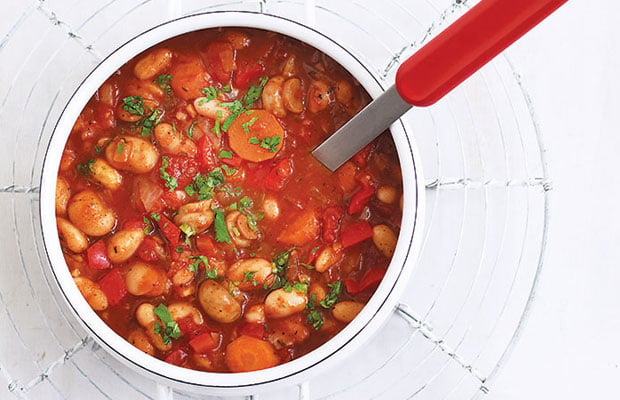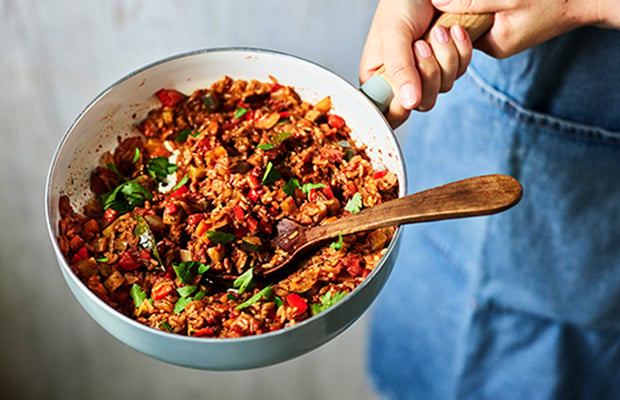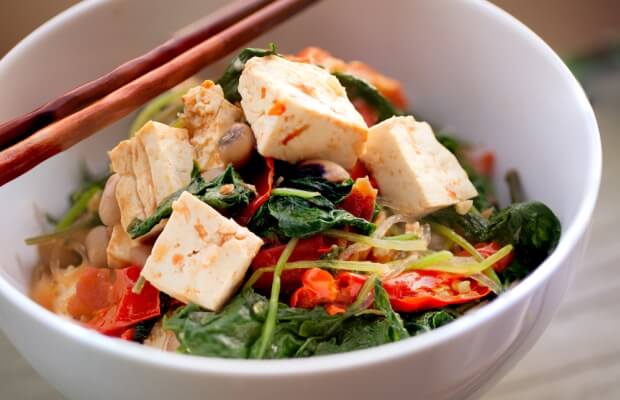1. Pulses

Pulses are an inexpensive protein choice, are high in fibre and a source of iron. They are part of the legume family and include all beans, peas and lentils. A daily serving helps to lower your cholesterol level and counts toward your 5-a-day. If you buy tinned pulses, check the label and choose ones that have no added salt or sugar. They are easy add-ins to sauces, soups and stews, even if they’re not used in the original recipe.
- 3 tbsp (120g) of baked beans contains 6g of protein
- 3 tbsp (105g) of chickpeas contains 8g of protein
- 3 tbsp (120g) of lentils contains 9g of protein
Try our chunky vegetable and bean goulash.
Want to get fit and healthy?
Sign up to our fortnightly Heart Matters newsletter to receive healthy recipes, new activity ideas, and expert tips for managing your health. Joining is free and takes two minutes.
I’d like to sign-up
2. Soya beans
.jpg?rev=efbe489a981d4c608f872510b2b71e14&hash=342ADDA04C1F469F090D40CE49724FF6)
Unlike other pulses, soya beans are a complete protein, comparable in quality with animal protein, but are low in fat and contain fibre and iron. Eating 25g of soya protein a day, instead of meat, can help lower cholesterol levels. This is equivalent to a glass of soya milk, a pot of soya yoghurt or an 80g serving of tofu.
- 100g of tofu contains 8g of protein
- 200ml of soya milk contains 6g of protein
Try our spiced tofu and carrot burgers.
3. Quinoa

Quinoa is cooked and eaten like a grain, but is actually a seed of a green vegetable related to chard and spinach. It is a good protein food, but it’s not the amount that is impressive, it’s the type. Unlike cereals, quinoa has all of the essential amino acids you find in animal protein. It is an easy substitute for rice and pasta.
Try our sweet potato and quinoa Buddha bowl.
4. Nuts

Nuts provide a good dose of protein in a handful and are packed with fibre. Although they are high in fat, and hence calories, most of this fat is heart-healthy unsaturated fats. But stick to a handful per day (30g).
- 30g of peanuts contains 8g of protein
- 30g of walnuts contains 4g of protein
- 30g of hazelnuts contains 4g of protein
Read our expert's view on nuts as a healthy snack.
5. Seeds
.jpg?rev=c8788d694def4dec979912ae88153e05&hash=89E86C543A9724B1173405184DDF336D)
Like nuts, seeds contain healthy unsaturated fats and protein. They can be easily added to a salad, pasta, breakfast or you can eat them plain as a simple snack.
- 30g of sunflower seeds contains 6g of protein
- 30g of pumpkin seeds contains 7g of protein
Looking for a range of vegan recipes to add to your weekly rotation? Have a look at our list of 35 easy vegan recipes.
6. Cereals and grains

Wholegrain breads, rice and pasta have more protein, fibre and iron than white versions. Brown rice with beans, or bread with hummus or nut butter, can give you as much protein as a piece of meat.
- 185g of cooked wholegrain rice(or 75g uncooked) contains 7g of protein
- medium slice of whole grain bread contains 3g of protein
- 40g of oats contains 4g of protein
- 58g of a wholemeal pitta contains 5g of protein
Try our vegan jambalaya made with wholegrain rice.
7. Dairy
.jpg?rev=a8cca3dc44d04b5f8815ac07d665e8f2&hash=23AE774C7FC5268B5D5619AB5C4B1242)
Milk, yoghurt and cheese are great sources of protein and also contain calcium to keep our bones healthy. Choosing lower-fat dairy options will help reduce your saturated fat intake without compromising on protein or calcium.
- 200ml of milk contains 7g of protein
- 150ml of plain yoghurt contains 8g of protein
- 30g of cheddar cheese contains 8g of protein
Read our guide to cheese: the good, the bad and the ugly.
8. Eggs
.jpg?rev=a42e1235dc6e47f88e59bed2dfac7a45&hash=4342D6366F0A66D19E427767C4D1B382)
It’s a myth that eggs are bad for your heart. Eggs do contain cholesterol, but it’s saturated fat that you need to worry about in terms of blood cholesterol levels. Eggs are low in saturated fat and good sources of B12 and vitamin D. There is no limit to how many eggs you can eat, but if you have familial hypercholesterolemia then talk to your doctor or dietitian for advice about your intake.
- 1 medium sized egg contains 7g of protein
How much do you know about eggs? Take our quiz to test your knowledge.
What your daily protein intake might look like
Breakfast
- Egg on toast: 9g of protein
Lunch
- Sandwich with 3tbsp of hummus: 11g of protein
- 150g pot of yogurt: 7g of protein
Dinner
- Veg and lentil chilli with brown rice: 16g of protein
Snack
- Handful of nuts: 7g of protein
Total: 50g of protein
Recommendation: 45 to 55g of protein
What to read next...








.jpg?rev=efbe489a981d4c608f872510b2b71e14&hash=342ADDA04C1F469F090D40CE49724FF6)


.jpg?rev=c8788d694def4dec979912ae88153e05&hash=89E86C543A9724B1173405184DDF336D)

.jpg?rev=a8cca3dc44d04b5f8815ac07d665e8f2&hash=23AE774C7FC5268B5D5619AB5C4B1242)
.jpg?rev=a42e1235dc6e47f88e59bed2dfac7a45&hash=4342D6366F0A66D19E427767C4D1B382)


